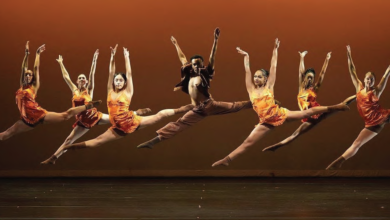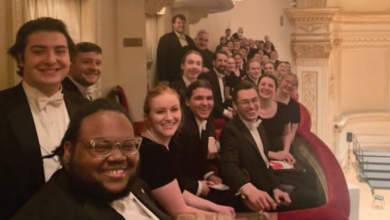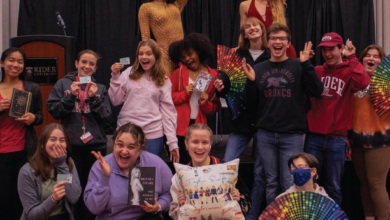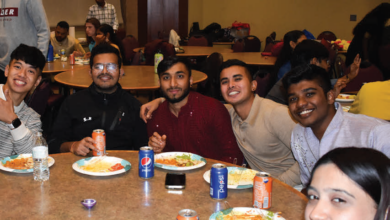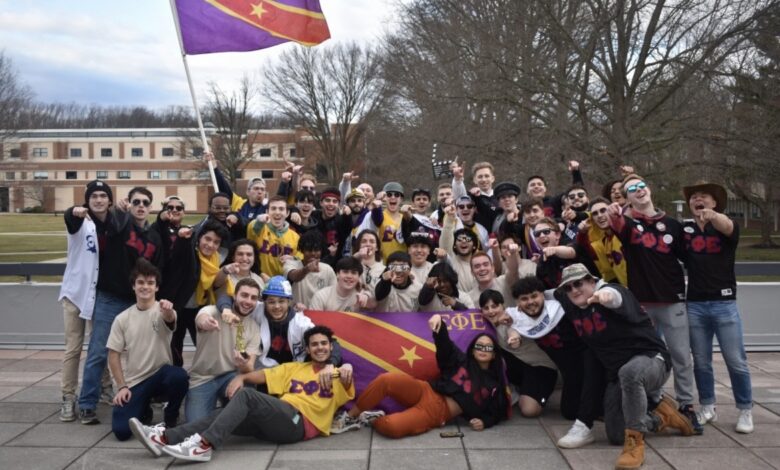
Opportunity October: Khalid Alargha reflects on moving from Syria
By Hannah Newman
Two different lives lived, multiple countries crossed and one story in the making.
In 2015, life blindsided 13-year-old Khalid Alargha when he had to drop everything, leave his home country of Syria during a civil war and reunite with his father, who had spent the last two years fighting for his family to follow him overseas.
“Coming to the United States, a land of freedom and a lot of rights, a land of opportunities, is a dream come true. Everybody aspires and chases after that dream,” said Alargha, a senior global supply chain management major. “Unfortunately, many people within the United States born and raised here do not see the true weight and gravity behind that.”
As a native of the oldest populated city in the world, Damascus, Syria, Alargha attended private school his entire life and had a stereotypical upbringing. He woke up for school, hung out with friends and received a good education.
“Everything was great. Full of joy, you know? There’s always an opportunity to flourish and learn a new thing when you are younger and I was very fortunate to attend private school because you get to learn a lot more than public schools,” said Alargha. “Unfortunately, the education system within private schools was much better than the public school system.”
Before tragedy struck
In 2011, Alargha’s father and uncle visited the U.S. for the first time for business purposes and fell in love with what America had to offer. His father knew that opportunity was ripe on American soil, and it was only a matter of time before he would come back to the U.S. to build a life for him and his family.
When Alargha’s father returned to Syria in 2011, the country as he knew it had transformed into something unrecognizable.
A civil war had ignited, as the Syrian regime on the side of President Bashar al-Assad was withholding human rights and controlling citizens.
With the shift in reality from 2011-13, Alargha’s father decided to take a job in the U.S. and work on getting the rest of his family there for a more secure life. The family included Alargha, his mother and two younger sisters.
They lived in the shadows and tried to run as far away as possible from what was just outside of every door, as warfare became normal in Alargha’s life and every day was fear ridden and filled with nothing but hope for survival.
“At the time, in 2013, I was 11 years old. I had stopped attending school in seventh grade because it was literal warfare. You know, missiles, people getting kidnapped,” said Alargha. “You would see or hear about someone getting killed or kidnapped everywhere you went.”
Public utilities were also held hostage and became outlets for checking people’s identities and take who they needed to serve in the military.

“Even with transportation around the city, everywhere you would go there’s an interior checkpoint and they would check everybody’s IDs, and they would run them … everybody has to walk places and stay in the shadows and not even get anywhere near the military checkpoints,” said Alargha. “Militaries were patrolling the entire town, the entire city. It was very scary to live in.”
A life of living “in the shadows” and gripping onto the hope for a miracle suddenly changed for the Alargha family in 2015 after Alargha’s father’s team of lawyers in the U.S. were able to win a case that brought his family to the country.
“Two and a half years after not seeing him, not being with him. I was 13 then and it was just like a profound experience. You know, obviously I missed him, I was very close to him.”
Without any Syrian airports open due to the war, the Alargha family had to take a flight out of Lebanon to the United Kingdom, then connecting to the U.S.
However, the reality of living on the edge intensified as their journey to the U.S. began and attacks struck all over the European region making flights unreliable.
“At the time, there were some, I don’t know what I would call it, but I’ll just say terrorist attacks going on, in that European region [the United Kingdom],” said Alargha. “On the day of our flight, one happened recently. So they blacklisted us from coming so we couldn’t even take that flight. We had to wait in the airport for 24 hours and wait for the lawyers to re-book our tickets.”
Exhaustion from running hit its peak as only a miracle caused their journey to continue. He and his family were able to get a flight to Istanbul, Turkey, which was one step closer to America and his father.
“Landing in Turkey was not easy at all, there is no language spoken in the airport besides Turkish, not even Arabic, not even English. So it was really hard to communicate and get around. We were lucky enough to find a computer and get in contact with my dad to let him know what had happened and where we were,” said Alargha. “It felt like a miracle.”
The beginning of a new life
Landing at the gates of John F. Kennedy International Airport opened so much more than the airplane doors. It opened up another chance at life for Alargha.
Montclair, New Jersey, became home to the Alargha family upon arrival to the U.S.
Alargha was in the eighth grade at the time. The intimidation of starting high school in a different country translated into the feeling of excitement.
“It felt like you’re reading a book and turning the page to a new chapter,” said Alargha. “I did not look behind, I just kept going.”
He was introduced to other foreign students who came from various countries, which bridged the gap in diversity between Alargha and his surroundings. As eighth grade went on, Alargha became a mentor to the students that were coming into his school standing in the same shoes he did, which allowed him to build more intimate relationships with his peers.
“I was able to meet my best friend as of right now [named] Dallas,” said Alargha. “He came from Brazil, and I was appointed to give him the orientation so we kind of clicked on the fact that we’re both foreigners with very minimal conversation, minimal English and not very well spoken.”
Alargha noted that in Syria, students did not move from class to class. Students were assigned one classroom with the same students and the teachers switched out for different subjects. The idea of having to be with a plethora of different kids in a day was something that enticed Alargha.
Adversity set in for Alargha when English had to become his primary language. “I was hearing and translating everything in real time to Arabic so anything that involves writing and reading was very difficult,” said Alargha.
After completing the required English as a Second Language course, Alargha met his mentor, an English teacher who was also Syrian and stood as an inspirational figure to him throughout his high school career.
“He spoke such perfect English and was my role model growing up. I let him know: ‘I want to be at your level of English because I don’t like where I’m at right now.’ He guided me through it, he wrote my college recommendation letter and helped me with my college essay that got me into Rider,” said Alargha. “I still aspire to be like him.”
Despite the hindrance in English comprehension, making friends came easy to Alargha as he met one of his best friends, senior global supply chain management major Abdel Abudiak. The friendship started after Alargha impressed him by solving a Rubik’s cube behind his back at lunch one day.
“The most inspiring aspect of knowing Khalid for so long has been witnessing his steady commitment to personal and professional growth,” said Abudiak. “Seeing him take on challenges with a strategic mindset and a positive outlook when it comes to certain things has been truly inspiring to me.”
When it came to college, Alargha knew he wanted to pursue a career related to business, which is how he ended up at Rider, knowing that the university was one of the top ten business schools in the state.
Despite the setbacks from COVID-19, Alargha and his roommate, Abudiak, were determined to meet as many people as they could upon arriving on campus.
The roommates received an email about a fraternity barbeque and were intrigued by the idea of Greek life.
After being reached out to by the brothers of Sigma Phi Epsilon, Alargha and Abudiak joined, although Alargha did not have the GPA to run for the executive board.
The brothers encouraged Alargha to work on raising his GPA which resulted in Alargha’s position as vice president of recruitment in spring 2021.
Falling in love with the leadership position, Alargha became an orientation leader that summer, which set him up for his position as president the following year.
Alargha’s efforts in Sigma Phi Epsilon grew contagious to the brothers, which pushed him even further in his efforts to grow in all areas of his life.
Junior exercise science major and brother of Sigma Phi Epsilon Reese Manfredi said, “Khalid is someone who is constantly looking to improve himself in all aspects of life. He has been so focused on his studies and his professional development has been so impressive. After attending two conventions for our fraternity, I was able to watch Khalid network so well with undergraduate students and alumni of our national fraternity.”
Abudiak, who is also his current roommate, remains in disbelief about where Alargha started in life as opposed to where he is now.
“He’s transformed challenges into opportunities, and his ability to navigate change has been truly remarkable seeing that he grew up in Syria for the majority of his life,” said Abudiak. “Witnessing his journey from initially joining, to eventually becoming the president of the organization, has shown not only his commitment to personal development but also his ability to take on increasingly challenging roles and responsibilities.”
As graduation approaches, Alargha keeps his two lives distant but his experiences continue to be a critical part of who he is today.
“I’m someone who’s always intrigued by new experiences and challenges. It’s very pivotal in my life,” said Alargha. “My time in Syria, I think of it as a past life. I haven’t really processed it yet you know, I think the only way for me to process it is for me to go back. I haven’t gone back since.”
